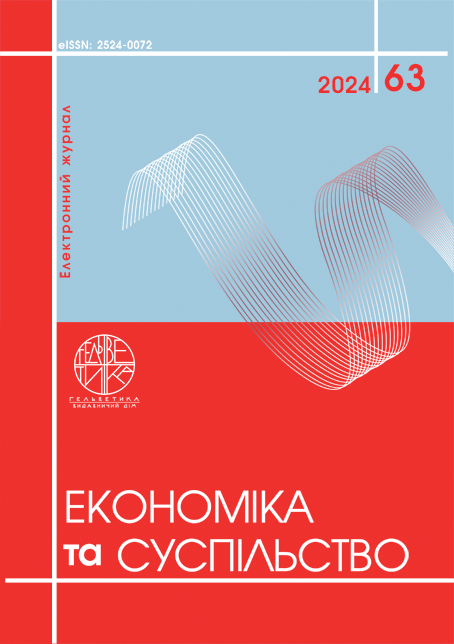OPTIMISATION OF LOGISTICS SUPPLY CHAINS IN THE FACE OF GLOBAL CRISES
Abstract
The article studies optimisation of logistics supply chains in the context of global crises. The relevance of the article lies in the importance of ensuring the efficiency and stability of logistics processes of companies in unstable conditions. Implementation of strategies for managing and optimising supply chains in crisis conditions allows companies to effectively withstand challenges and logistical disruptions. The purpose of the article is to determine the directions of optimisation of logistics supply chains in the context of growing global crises. In the course of the study, the author used various methods to analyse the impact of the crisis on supply chains. In particular, the systemic method, the method of analysis and synthesis, the integrated and structural-functional approach, and the dialectical method of cognition. In the course of writing the article, it was found that optimisation of logistics supply chains in the context of global crises can be implemented at four stages (identification of strategies for adaptation to crisis conditions, establishment of a monitoring system, analysis of the impact of risks, development of emergency action plans). The article outlines the main strategies for supply chain management, which require the use of modern technologies, diversification of sources of supply, optimisation of inventories, ensuring transparency and tracking of supply chains, investing in own logistics capacities, increasing the level of cooperation and coordination between chain participants, and adapting to changes in the external environment. A sequence of actions to optimise logistics supply chains under conditions of uncertainty has also been developed. The proposed strategies and developed optimisation steps can serve as a basis for companies to implement practical measures in the logistics sector in times of crisis.
References
Завербний А.С., Двуліт З.П., Вуєк Х.І. Особливості формування логістичних ланцюгів в умовах війни та у післявоєнний період. Економіка та суспільство. №43. 2022. URL: https://economyandsociety.in.ua/index.php/journal/article/view/1750
Ремзина Н. Особливості управління ланцюгами постачання в умовах кризових явищ. Розвиток методів управління та господарювання на транспорті. 2023. № 1 (82). С. 110–124.
Терещенко С. І., Євтушенко А. М. Логістичний ланцюг постачання: управління та оптимізація. Журнал стратегічних економічних досліджень. № 6(17), 2023. С. 207–214.
Chopra, S., Sodhi, M. S. (2014) Reducing the risk of supply chain disruptions. MIT Sloan Management Review, vol. 55(3), pp. 73–80
Ellram, L. M., Tate, W. L., Petersen, K. J. (2013).Offshore outsourcing: Implications for international business and strategic management theory and practice. Journal of International Business Studies, vol. 44(5), pp. 493–504
Kersten, W., Seiter, M., von See, B., Hackius, N., Maurer, M. (2017) Reducing complexity in logistics systems: Standardization and harmonization approaches. Logistics Research, vol. 10(1), pp. 1–13.
Manag Rev Q. (2022) Supply chain management in times of crisis: a systematic review. URL: https://www.ncbi.nlm.nih.gov/pmc/articles/PMC9362030/
Mishra, A. Gupta, N. Jha, G. K. (2024) Supply Chain Resilience: Adapting To Global Disruptions and Uncertainty. International Journal of Innovative Research in Engineering. vol. 5(2). рр.189–196
Tang, C. S. (2006). Perspectives in supply chain risk management. International Journal of Production Economics, vol. 103(2), pp. 451–488.
Sarkis, J., Cohen, M. J., Dewick, P., Schröder, P. (2021). A brave new world: Lessons from the COVID-19 pandemic for transitioning to sustainable supply and production. Resources, Conservation and Recycling, № 2. C.167–174.
Zaverbnyi A.S., Dvulit Z.P., Vuiek Kh.I. (2022) Osoblyvosti formuvannia lohistychnykh lantsiuhiv v umovakh viiny ta u pisliavoiennyi period [Features of the formation of logistics chains in the conditions of war and in the post-war period]. Ekonomika ta suspilstvo – Economy and society, vol. 43. Available at: https://economyandsociety.in.ua/index.php/journal/article/view/1750
Remzyna N. (2023) Osoblyvosti upravlinnia lantsiuhamy postachannia v umovakh kryzovykh yavyshchь[Features of supply chain management in crisis conditions] Rozvytok metodiv upravlinnia ta hospodariuvannia na transporti – Development of management methods and hospodarivaniya in transport, vol. 1 (82). pp. 110–124
Tereshchenko S. I., Yevtushenko A. M. (2023) Lohistychnyi lantsiuh postachannia: upravlinnia ta optymizatsiia [Logistics supply chain: management and optimisation]. Zhurnal stratehichnykh ekonomichnykh doslidzhen – Journal of strategic economic research, vol. 6(17), pp. 207–214.
Chopra, S., Sodhi, M. S. (2014) Reducing the risk of supply chain disruptions. MIT Sloan Management Review, vol. 55(3), pp 73–80.
Ellram, L. M., Tate, W. L., Petersen, K. J. (2013) Offshore outsourcing: Implications for international business and strategic management theory and practice. Journal of International Business Studies, vol. 44(5), pp. 493–504.
Kersten, W., Seiter, M., von See, B., Hackius, N., Maurer, M. (2017) Reducing complexity in logistics systems: Standardization and harmonization approaches. Logistics Research, vol.10(1), pp. 1–13.
Manag Rev Q. (2022) Supply chain management in times of crisis: a systematic review. Available at: https://www.ncbi.nlm.nih.gov/pmc/articles/PMC9362030/(accessed June 21, 2024)
Mishra, A. Gupta, N. Jha, G. K. (2024) Supply Chain Resilience: Adapting To Global Disruptions and Uncertainty. International Journal of Innovative Research in Engineering. vol.5(2). pp.189–196.
Tang, C. S. (2006). Perspectives in supply chain risk management. International Journal of Production Economics, vol.103(2), pp. 451–488.
Sarkis, J., Cohen, M. J., Dewick, P., Schröder, P. (2021). A brave new world: Lessons from the COVID-19 pandemic for transitioning to sustainable supply and production. Resources, Conservation and Recycling, vol. 2, pp.167–174.
Copyright (c) 2024 Вікторія Кривещенко, Геннадій Хмурковський, Тетяна Ляденко

This work is licensed under a Creative Commons Attribution 4.0 International License.


